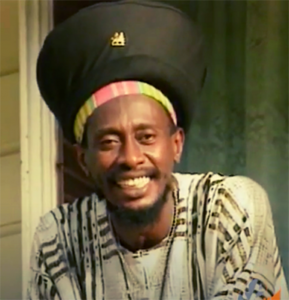
To Trinidad and Tobago, Brother Resistance was much more than an artistic icon; he was a fount of cultural knowledge. With his passing at a private hospital on July 13 (he had been ailing for some time), the country has lost an elder of its musical artforms—calypso and soca, to be sure—but more specifically, its hybrid, rapso.
Part poetry, part scintillating backbeat, rapso is defined as “the power of the word in the rhythm of the word,” having grown out of the West African griot or storyteller tradition. In the Caribbean, these musical poets have been traditionally referred to as chantwells, champions of call and response.
Born Roy Lewis in east Port of Spain, Trinidad, in 1954, Brother Resistance, as he would most popularly come to be called, eventually changed his name to Lutalo Masimba to better reflect his African heritage. He received his secondary education at the prestigious Queen’s Royal College, famous for producing figures such as Eric Williams, the country’s first prime minister, writers C.L.R. James and V.S. Naipaul. The school inducted Brother Resistance into its Hall of Honour in 2017 in recognition of his contribution to culture and the arts.
Rapso music was pioneered by the late Lancelot Layne, evolving as a brand of protest music out of the Black Power movement of the late 1960s. Brother Resistance, along with the Network Riddum Band, took up the rapso mantle and carried the form into the 1980s and beyond, spearheading its revival and bringing it into the mainstream of World Music.
The band’s 1981 debut offering “Busting Out” contained two tracks, one written by Brother Resistance, and became a hit. The following year the group released “Roots of de Rapso Riddum”, but their message, deeply rooted in social commentary, was deemed subversive. Police raided and destroyed their band room in June 1983, which only served to fuel their sense of purpose. They continued to release music, always putting the genre front and centre: “Rapso Explosion” (1984), “Rapso Takeover” (1986), and “Rapso Uprising” (1989).
Brother Resistance continued to be prolific as a solo artist well into the 1990s and 2000s, singing on themes of love, unity, spirituality, and respect for “Mother Earth”, a song that demonstrated just the depth of his perception and vision. Long before the term climate change was coined, Brother Resistance was asking, “Is it too late to save the earth?”
Perhaps his most beloved song, however, was “Ring De Bell”, in which he symbolically advocates for ringing the bell—part of Spiritual Baptist, Orisha and other religious traditions—for culture, justice, freedom and, of course, rapso: “It’s a long, long time now we fighting for freedom, victory bound to come […] I come with my bell just to second the motion, rock the rapso riddum.”
In a telephone interview, Robin Foster, who attended Queen’s Royal College with Brother Resistance and later worked with the Network Riddum Band as a sound engineer, remembered him as a true poet who would mix his love of language with music:
“He was the chantwell of the school. At cricket and football matches, he led the chant and would always compose the school songs for Intercol [the secondary schools football league]. He used to deejay at school bazaars. I’ll never forget seeing one of his party flyers promoting what was called ‘The Cold Concrete Network’. He took that concept of networking and ran with it.”
For Foster, though, one of Brother Resistance’s most enduring legacies was his embracing of “Trinbagonian” as its own language:
“Resistance was a bright, highly educated man, and he regarded our way of speaking as more than a dialect, more than broken English — and that was really important at a time when anything but standard English was considered uncultured. Resistance was proud to be Trini.”
Having completed his tertiary education at The University of the West Indies (UWI), Brother Resistance was awarded a Master’s degree in Carnival Studies from the University of Trinidad and Tobago in 2012, and was in the process of completing his Ph.D. at UWI.


